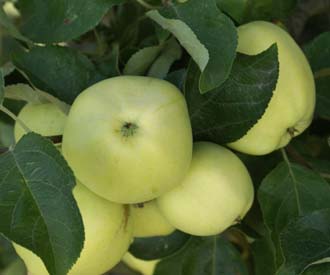Autumn 2025 / Winter 2026 seasonWe still have plenty of trees left for the winter planting season, but it is best to order ASAP.
Keepers NurseryThe UK's largest range of fruit trees
Tel. 01622 326465
White Transparent

One of the earliest apples to ripen. Too sharp as a dessert apple for most people but good as a cooker.
Origin: Russia, 1800
Pollination: White Transparent is partially self-fertile and would produce some crop without a pollinator but would benefit considerably from a pollinator.Find pollination partners >
British-grown  All our bare-root trees are personally hand-grafted by our Nursery Manager and grown on at our nursery in Kent. We have Defra and Plant Healthy certification.
More ...
All our bare-root trees are personally hand-grafted by our Nursery Manager and grown on at our nursery in Kent. We have Defra and Plant Healthy certification.
More ...
History and description of White Transparent
White Transparent apple arose in Russia or the Baltic States. Widely grown in 19th Century Europe. Introduced to North America in 1870 where it was known as Yellow Transparent and grown commercially as an early dual purpose variety. Still grown in Russia and Sweden.Medium sized, round-conical fruit. Very pale green skin with a white bloom. Juicy, almost white flesh. Quite sharp, refreshing taste. A little too sharp as a dessert apple. A good culinary variety cooking to a cream coloured puree with good flavour needing little added sugar. The fruit bruises easily and goes soft soon after picking.
Moderately vigorous tree. Very hardy. Good resistance to scab and mildew, but susceptible to canker and fireblight. Good, regular cropper. The very pale, almost luminescent, green apples look attractive on the tree.
Characteristics of White Transparent apple trees
| Use | Dual Cul & Des |
| Colour | Green |
| Flavour | Sharp |
| Fruit size | Large |
| Picking time | Late Jul/Early Aug |
| Season of use | Jul-Aug |
| Tree vigour | Moderate |
| Tree habit | Upright-spreading |
| Fruit-bearing | Spur-bearer |
| Cropping | Good |
| Disease resistance | Canker - Susceptible Scab - Resistant Mildew - Resistant |
| Pollination date | 6 |
| Pollination group | B |
| Self-fertility | Partially self-fertile |
| Pollinators | Pollination partners |
Varieties you viewed